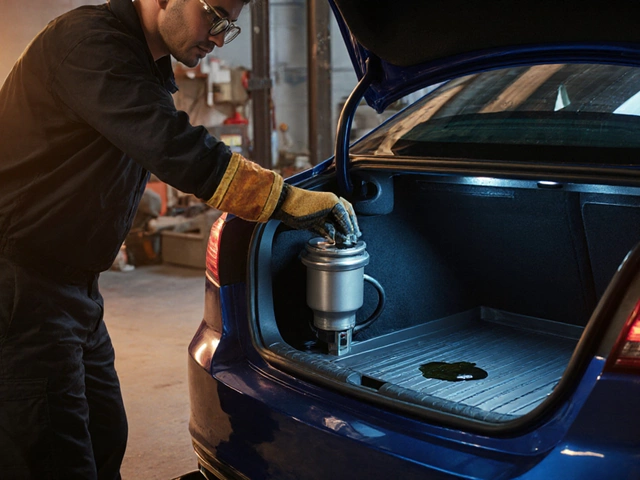Ever wondered why your car's engine doesn't feel as zippy as it used to? It might just be the spark plugs asking for a clean-up. Spark plugs are like the unsung heroes of your engine, zapping life into it with every spark. Keeping them clean is key to a smooth ride and top-notch fuel efficiency.
Now, if you're uncertain about when to give these little guys a scrub, a general rule of thumb is every 30,000 miles. But that's just a guideline. If your car starts to feel like it’s chugging more gas or starts idling rough, your spark plugs might need a check-up sooner. And hey, a little proactive maintenance never hurt anyone, right?
- Why Clean Spark Plugs?
- Signs Your Spark Plugs Need Cleaning
- How Often to Clean Them
- Tips for Cleaning Spark Plugs
Why Clean Spark Plugs?
Spark plugs might be small, but they play a huge role in keeping your car's engine running smoothly. Cleaning them can make a noticeable difference in how well your vehicle performs. Let's dive into why giving your spark plugs some regular TLC is worthwhile.
Boost Engine Performance
Cared-for spark plugs are essential for optimal engine performance. Over time, these plugs can accumulate carbon deposits, which can hinder the spark needed for ignition. Cleaning away this gunk ensures that the spark is strong, boosting your engine's efficiency and responsiveness.
Save on Fuel
Did you know that dirty spark plugs can lead to poor fuel economy? When spark plugs are clogged up with debris, it takes more fuel to generate the same power. By keeping them clean, your engine burns fuel more efficiently, which might even save you a bit on your next gas station visit.
Prevent Costly Repairs
Regularly cleaning your spark plugs can help avoid bigger issues down the road, like engine misfires or damage to your catalytic converter. These problems can be costly to fix, so keeping plugs clean is a simple maintenance step that can help you avoid a hefty repair bill.
Reduce Emissions
Clean spark plugs can also help reduce your car's emissions. When spark plugs function properly, your engine runs cleaner, which means fewer pollutants are getting released into the air. That's a win for both performance and the planet!
| Benefit | Impact |
|---|---|
| Boost Performance | Improved engine efficiency |
| Save Fuel | Better gas mileage |
| Prevent Repairs | Avoids costly issues |
| Reduce Emissions | Lower environmental impact |
Signs Your Spark Plugs Need Cleaning
How do you know when your spark plugs need some TLC? It's not as obvious as a flat tire, but there are clear signs to watch out for. Let's break it down, so you don't miss a beat the next time you're under the hood.
Engine Misfires
If your car feels like it's coughing or sputtering, that's an engine misfire. Misfires occur when the air-fuel mixture in the engine isn't ignited at the right time. Dirty spark plugs are often the culprits behind these hiccups. In fact, a report by the National Institute for Automotive Service Excellence states, "Spark plug performance affects the overall health of the engine more than drivers realize."
Poor Fuel Economy
Noticing that you're spending more time and money at the gas station than usual? Worn or dirty spark plugs might be at fault. When plugs don't ignite the fuel-air mixture efficiently, it can lead to increased fuel consumption. Simply cleaning or replacing them can bump your mileage back up to where it belongs.
Difficulty Starting the Engine
If your car struggles to start in the morning, don't just blame the weather. Dirty spark plugs can make it tougher for the engine to turn over, especially in the cold. This is a key sign that those spark plugs need attention.
Rough Idling
Does your car vibrate more than usual when idling? That's a classic indicator that something's up with your plugs. When spark plugs are dirty, they can't fire normally, causing those annoying vibrations. A quick clean can often smooth things out.
| Symptom | Possible Cause |
|---|---|
| Engine Misfires | Dirty or worn spark plugs |
| Poor Fuel Economy | Inadequate spark plug performance |
| Difficulty Starting | Fouled spark plugs |
| Rough Idling | Ignition issues due to plugs |
The signs aren't always glaring, but being attuned to these key symptoms can save you a trip to the mechanic. Remember, regular maintenance is your friend when it comes to keeping your engine—and your wallet—happy.

How Often to Clean Them
So, you're probably wondering how often you should bother scrubbing those spark plugs. The mileage rule of thumb here is usually every 30,000 miles. But let's face it, not all cars and driving habits are created equal. Cleaning frequency can depend on your vehicle's age, the kind of fuel you use, and your usual driving conditions. If you're into city driving with lots of stop-and-go traffic, you might need to pay attention a bit more often than highway cruisers.
Consider Your Driving Style
Your car's owner's manual can give you a solid clue on maintenance schedules, but it's more of a guideline than a law. If you're driving a lot through dusty roads or using lower quality fuel, spark plugs will likely accumulate grime faster. Just like checking the oil, a routine check of the plugs for visible signs of wear or carbon deposit can save you a headache later.
Assess Conditions
Now, if your engine starts to misfire or you notice a dip in fuel economy, it might be time to pop the hood sooner rather than sticking rigidly to the mileage rule. Keeping an eye out for symptoms like hard starts or decreased throttle response can give you a head start on cleaning spark plugs before they become a bigger problem.
Personal Maintenance Schedule
If you're the hands-on type, or maybe just a curious car owner who isn’t afraid of getting greasy, you can inspect and clean them yourself to keep track of their condition. Investing a little time every 15,000 miles for a quick check can ensure they're grime-free and in tip-top shape. Besides, regular checks help you catch small issues before they turn into big repairs.
Every car is different, and so is every driver. The best course of action? Mix regular maintenance, common sense, and maybe tap into the wisdom of a trusted mechanic if you're ever unsure. By keeping a mindful eye on your ride, you won't just boost your engine performance; you'll extend the life of whatever it is that's bringing you from point A to B.
Tips for Cleaning Spark Plugs
Cleaning spark plugs might seem like a daunting task, but with the right tips, you'll be cruising through it in no time. Here’s how to do it efficiently and effectively.
Gather Your Tools
Before you get started, make sure you have the necessary gear. You’ll need a spark plug socket, a ratchet, a gap gauge, sandpaper, and a wire brush. Don’t forget safety goggles and gloves to keep yourself protected.
Remove the Spark Plugs
- Begin by disconnecting the negative battery cable to prevent any electric shocks.
- Locate the spark plug wires. Gently twist and pull them off, one at a time. Make sure to keep track of which wire goes where to avoid mix-ups.
- Use the spark plug socket and ratchet to carefully unscrew and remove the spark plugs.
Cleaning Process
Once you've got the spark plugs out, it’s time to clean them up.
- Inspect each plug for damage or heavy wear. If they’re cracked or electrodes are too worn out, you might need to replace them instead.
- Use sandpaper to gently clean away carbon deposits around the plug’s electrodes.
- For stubborn grime, a wire brush can help scrub it off.
- Check the gap with a gap gauge. The gap should be per the vehicle's recommendation, usually around 0.028-0.060 inches.
Reinstall the Spark Plugs
- Carefully thread the cleaned or new spark plugs back into their respective holes by hand to avoid cross-threading.
- Tighten them securely with the ratchet and spark plug socket.
- Reconnect the spark plug wires in their original order.
- Reconnect the negative battery cable.
And there you are! Your engine will thank you for giving those spark plugs some well-deserved attention. Regular cleaning doesn't just prolong the life of the plugs; it helps keep your entire engine running smoothly.




